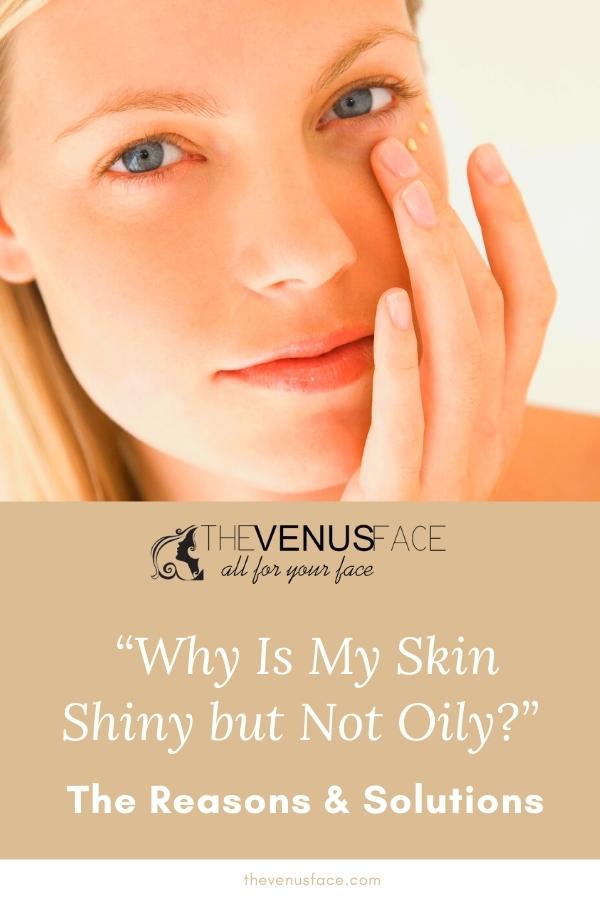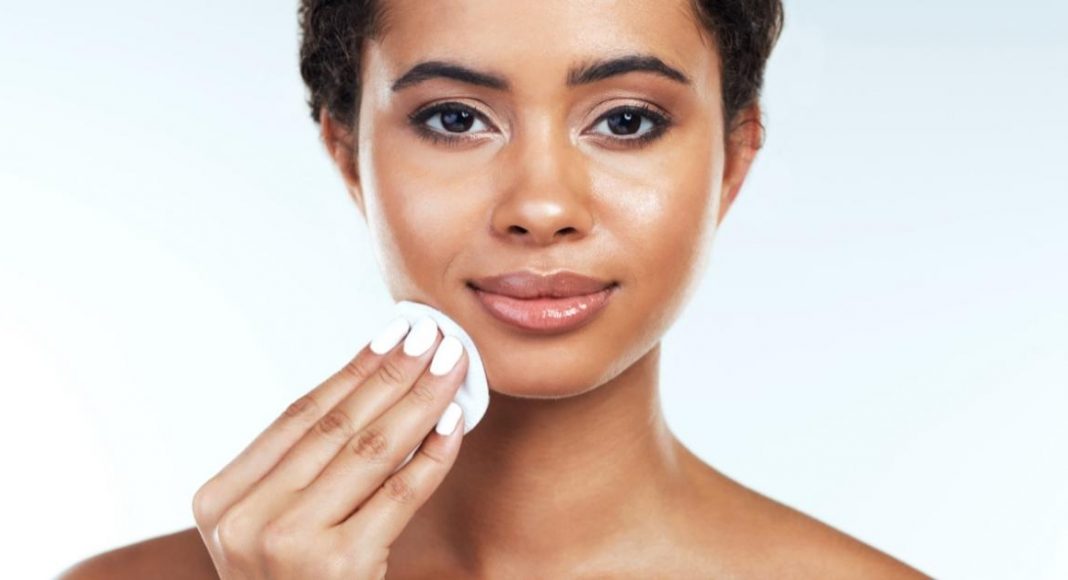Oily skin is a common skin condition that people want to get rid of. Oily skin is not only unsightly, but it has more medical concerns than normal skin. The oil on the skin blocks pores and attracts dirt and bacteria, which can lead to acne. People want to get rid of their oily skin for various reasons; some people suffer from acne while others just don’t like the shiny look that you can find with this type of skin. But what if you don’t have oily skin but your face is still shiny? Why is my skin shiny but not oily?

2 reasons why skin is shiny but not oily and the solutions
Oily skin is not the only factor that causes shiny faces. In fact, there is more than 1 reason that causes shiny skin.
One of them is not having enough facial moisturizer. This can be true especially during the cold and dry winter months when your face is not receiving any moisture from the air outside. All of this dry weather kills off the natural oils in the skin, making it appear with a shiny look.
Over-exfoliation
Skin exfoliation is good; however, if you exfoliate too frequently, the skin cell turnover will be out of balance. The skin cells are not aged as quickly as they are removed, therefore the new cells build-up causes a “greasy” effect on the surface of your face. The skin is thin and smooth to the degree that even makeup or powder foundation can’t stick.
Therefore, it is important to follow a proper skincare routine so that you don’t over-exfoliate and cause your skin to become shiny. Otherwise, you need to heal over-exfoliated skin.
More: Best Peel-Off Masks for Oily Skin for Youthful Skin
Dehydrated skin
Dehydrated skin is different from dry skin. It is not a skin type, it’s a skin condition that is lacking water. When the skin cells don’t have enough water, dehydrated cells may appear glossy, which causes a shiny face.
Treating dehydrated skin may not be as easy as it seems. It is recommended to drink more water, follow a healthy diet and know what foods are suitable for the condition. However, a dermatologist is recommended when it comes to dehydrated skin treatment.
Why is my face shiny after washing it?
It’s because the top layer of your skin isn’t moisturized, resulting in a lifeless dead skin cell layer that is simply gleaming. Normally, the skin is protected by sebum (oil) that has seeped into the skin, which makes the top layer nourished and moisturized. This protective barrier may be damaged by over-washing or using alcohol, resulting in a lack of moisture on top.
The solution is to wash your face less frequently (with fewer portions and shorter washing times), as well as moisturize 2-3 times each day. Besides that, using a suitable cleanser/face wash is recommended.
Why is my nose so shiny after I wash my face?
The reasons are the same as mentioned above, but this time the area of effect is your nose only. This usually happens in people with combination skin, because the nose is the only part that becomes shinier than other parts of the face.
The solution for this is also the same as above, but perhaps it’s best to wash your face with a gentle cleanser instead of the harsh one.
This issue may not be fixed in a couple of days, in fact, it may take weeks or months to see a difference. Thus, if you want to hide the shiny nose, consider using a powder foundation that matches your skin tone.
Why is my forehead so shiny but not oily?
Forehead shine without oiliness can be attributed to various factors, such as sweat, emotions, climate, and even skincare practices. Several reasons contribute to this phenomenon:
- Sweat and Humidity: Your forehead can appear shiny due to sweat, especially in hot and humid conditions. Sweat can create a sheen on the skin’s surface.
- Skin Type: Skin can produce a natural shine even without excess oiliness. Combination skin, which has both oily and dry areas, can result in localized shine.
- Over-Exfoliation: Excessive exfoliation can compromise the skin’s barrier, leading to water loss and a shiny appearance. It’s important to use exfoliation methods that are gentle and suitable for your skin type.
- Dehydration: Dehydrated skin can look shiny due to the lack of moisture. Proper hydration is essential to maintain a healthy skin barrier.
- Stress and Emotions: Emotional factors like stress can lead to increased sebum production and shininess.
- Climate and Environment: Changes in weather and environmental factors can influence how your skin behaves, leading to shine.
- Makeup and Skincare Products: Certain makeup products and skincare routines can contribute to skin shine, especially if they are not suitable for your skin type.
Why does my face look shiny after moisturizer?
The reason should be the moisturizer itself. If the moisturizer is not suitable for your skin type, it may be too greasy or oily, causing your face to shine.
The solution is simple; stop using that particular product and try another one. There are plenty of facial moisturizers available in the market these days, just look around until you find the perfect match! Pro tip: consider using moisturizers for oily skin, those products are designed with proper ingredients, such as non-comedogenic and oil-free.
How do I get rid of shiny face?
As mentioned above, following a good skincare routine is recommended when it comes to treating shiny skin. Some solutions are:
- Don’t over-exfoliate
- Dehydrated skin treatment
- Drink more water
- Avoid heavy makeup
- Use a gentle cleanser & wash your face less frequently
- Moisturize your skin often with a suitable moisturizer.
If this doesn’t work, consider contacting a dermatologist to get professional advice on how to fix the problem.
More: Best Face Serums for Oily Skin to Maintain Your Youth
Final thought
There are 2 main reasons you don’t have oily skin but still have a shiny face: hydration levels & over-exfoliation. The trick is to find out the exact cause so that you can take appropriate & quick steps to fix it.
However, if none of those solutions work for you and your skin is still looking shiny after following the tips we’ve provided here, it may be time to consult with a dermatologist about more severe treatments. As always, just share your thought & comment below!
F.A.Q
Can diet affect skin shininess?
Yes, a diet high in processed and sugary foods can increase sebum production, leading to increased skin shininess. On the other hand, a diet rich in fruits, vegetables, and healthy fats can help regulate sebum production and reduce skin shininess.
Is it necessary to treat skin shininess?
It depends on the individual. If the shininess is causing discomfort or self-consciousness, then it may be worth treating. However, if it is not causing any issues, then there is no need to treat it.
Can hormonal changes affect skin shininess?
Yes, hormonal changes can increase sebum production, leading to increased skin shininess. This is why many people experience increased skin oiliness during puberty, menstruation, and pregnancy.
How can I determine if my skin is oily or just shiny?
Oily skin will often feel greasy to the touch and may be prone to acne breakouts. Shiny skin, on the other hand, may feel dry or normal to the touch and is not necessarily prone to acne breakouts.
More: Top microcurrent devices for professional and at-home use.
References: https://hellogiggles.com/beauty/over-exfoliation-skin-treatment/


